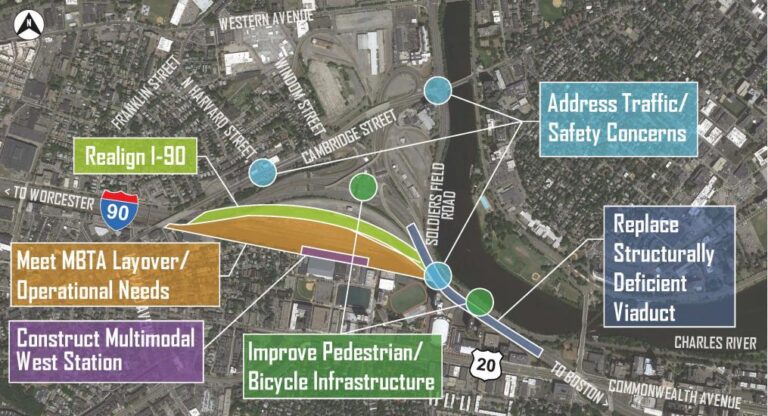The Allston Multimodal Project, a critical infrastructure initiative aimed at enhancing transportation connectivity and safety in the Allston neighborhood, continues to make significant strides. As the ambitious project moves forward, recent developments highlight important milestones and ongoing construction efforts that promise to reshape local transit and mobility. This update details the latest progress, key achievements, and upcoming phases, providing residents and commuters with a clear picture of what to expect in the coming months.
Table of Contents
- Allston Multimodal Project Advances with Key Infrastructure Milestones
- Detailed Analysis of Transit Improvements and Community Impact
- Expert Recommendations for Enhancing Project Efficiency and Accessibility
- Future Outlook and Anticipated Benefits for Greater Boston Transportation Network
- The Conclusion
Allston Multimodal Project Advances with Key Infrastructure Milestones
The Allston Multimodal Project has hit several critical milestones this month, marking significant progress toward enhancing transportation connectivity in the area. Key infrastructure elements, such as the newly constructed bridge foundations and upgraded rail corridors, are now reaching completion ahead of schedule. These advancements not only promise improved transit flows but also set a strong foundation for upcoming phases focusing on pedestrian and bicycle pathways.
Stakeholders have highlighted the project’s commitment to sustainable urban mobility, emphasizing features that incorporate cutting-edge technology and environmentally conscious design. Among the recent achievements are:
- Installation of advanced signaling systems to optimize train traffic management.
- Expansion of bus rapid transit lanes enhancing regional bus service reliability.
- Integration of green infrastructure elements aimed at stormwater management and reducing urban heat.
Detailed Analysis of Transit Improvements and Community Impact
The recent phase of the Allston Multimodal Project underscores significant enhancements aimed at streamlining transit efficiency and bolstering connectivity across key neighborhoods. New infrastructure developments include upgraded bus lanes, expanded pedestrian pathways, and integrated cycling routes, all designed to facilitate smoother, safer commutes. These measures are anticipated to reduce congestion during peak hours and promote sustainable travel alternatives, directly addressing the growing transportation demands of the Allston community.
Community engagement has remained at the forefront throughout the planning and construction process, with authorities ensuring resilience and inclusivity. Key impacts on the community include:
- Improved accessibility for people with disabilities through modernized station designs
- Creation of new public green spaces that enhance neighborhood livability
- Minimized disruption to local businesses via adaptive construction schedules
These initiatives reflect a balanced approach that prioritizes both mobility enhancements and quality-of-life improvements, setting a model for future urban transit projects in the region.
Expert Recommendations for Enhancing Project Efficiency and Accessibility
To expedite the Allston Multimodal Project while maintaining high standards of quality and inclusivity, experts emphasize the adoption of integrated project management tools tailored to real-time collaboration. This approach ensures seamless communication between engineering teams, urban planners, and community stakeholders, reducing delays commonly caused by siloed workflows. Additionally, deploying modular construction methods has been recommended to streamline assembly phases, significantly cutting down on-site time and minimizing urban disruption.
Accessibility remains a paramount focus, with specialists advocating for the incorporation of universal design principles from the initial planning stages. Priorities include:
- Inclusive transit nodes: Facilities that cater to individuals with diverse mobility needs, including tactile guidance systems and step-free access.
- Advanced wayfinding technology: Digital kiosks and mobile-integrated navigation aids to enhance user experience for all passengers.
- Community engagement: Continuous feedback loops with local residents to adapt facilities and services according to evolving accessibility requirements.
Implementation of these recommendations is projected to not only increase operational efficiency but also foster a transit environment that welcomes every commuter, reflecting the project’s commitment to a forward-thinking, equitable infrastructure.
Future Outlook and Anticipated Benefits for Greater Boston Transportation Network
As work on the Allston Multimodal Project advances, the transformation promises to redefine travel across Greater Boston. Stakeholders anticipate a profoundly interconnected transportation ecosystem where commuters benefit from significant reductions in congestion and enhanced access to public transit options. The integration of new bike lanes, pedestrian pathways, and state-of-the-art transit facilities aims to promote sustainable mobility choices and ease daily commutes. Key expected outcomes include:
- Improved travel times and fewer bottlenecks across critical transit corridors
- Increased ridership on the region’s mass transit lines due to better connectivity
- Support for economic growth through enhanced access to business hubs and innovation districts
- Enhanced safety and accessibility for cyclists and pedestrians along major routes
Beyond immediate transit improvements, the project sets a framework for long-term resilience and environmental stewardship in Greater Boston’s transportation strategy. By prioritizing multimodal access and modern infrastructure, the initiative addresses future population growth and evolving commuter needs. Experts highlight the potential for this project to serve as a replicable model nationwide, showcasing how thoughtful urban planning can lead to a more efficient, equitable, and environmentally conscious transportation network.
The Conclusion
As the Allston Multimodal Project continues to advance, these latest developments underscore the city’s commitment to enhancing transportation infrastructure and connectivity. Stakeholders and residents alike will be closely watching the upcoming phases to see how these improvements translate into tangible benefits for daily commuters and the broader community. With construction proceeding on schedule and key milestones approaching, the Allston project remains a pivotal endeavor in shaping the future of transit in the region.

